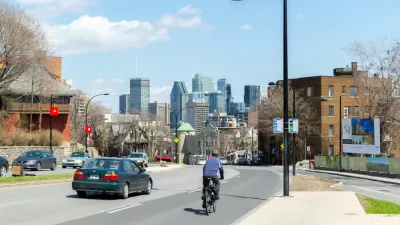Cities around the world are failing to achieve progress toward their sustainability and public health goals, new research finds.

New research from Brookings indicates that, around the world, “City leaders and their partners must do more to build healthy and sustainable places.” Geoff Boeing describes the project, which developed a set of tools for consistently calculating urban sustainability indicators.
According to their results, “Cities often adopted policies that: 1) were inconsistent with public health evidence; 2) were far more likely to use rhetoric that endorsed health and sustainability goals than adopt measurable policy targets; and 3) left substantial implementation gaps.”
The researchers examined walkability and accessibility in cities around the world, finding that “Older inner cities tend to be more walkable; newer outer suburbs less so. High-income European cities tend to perform well, while high-income cites [sic] in the U.S., Australia, and New Zealand tend to perform poorly.” The study also looked at access to public transit stops and healthy food stores, finding that U.S. cities performed poorly in those areas as well.
According to Boeing, “Our study developed open-source software and open data in conjunction with local collaborators so that, for the first time, city leaders can both benchmark their progress against other cities and monitor that progress over time.” The researchers say they hope having measurable standards can help cities set concrete targets for building healthier cities and share knowledge and resources for achieving them.
FULL STORY: Around the world, cities are falling short on health and sustainability goals

Maui's Vacation Rental Debate Turns Ugly
Verbal attacks, misinformation campaigns and fistfights plague a high-stakes debate to convert thousands of vacation rentals into long-term housing.

Planetizen Federal Action Tracker
A weekly monitor of how Trump’s orders and actions are impacting planners and planning in America.

Chicago’s Ghost Rails
Just beneath the surface of the modern city lie the remnants of its expansive early 20th-century streetcar system.

Bend, Oregon Zoning Reforms Prioritize Small-Scale Housing
The city altered its zoning code to allow multi-family housing and eliminated parking mandates citywide.

Amtrak Cutting Jobs, Funding to High-Speed Rail
The agency plans to cut 10 percent of its workforce and has confirmed it will not fund new high-speed rail projects.

LA Denies Basic Services to Unhoused Residents
The city has repeatedly failed to respond to requests for trash pickup at encampment sites, and eliminated a program that provided mobile showers and toilets.
Urban Design for Planners 1: Software Tools
This six-course series explores essential urban design concepts using open source software and equips planners with the tools they need to participate fully in the urban design process.
Planning for Universal Design
Learn the tools for implementing Universal Design in planning regulations.
planning NEXT
Appalachian Highlands Housing Partners
Mpact (founded as Rail~Volution)
City of Camden Redevelopment Agency
City of Astoria
City of Portland
City of Laramie





























